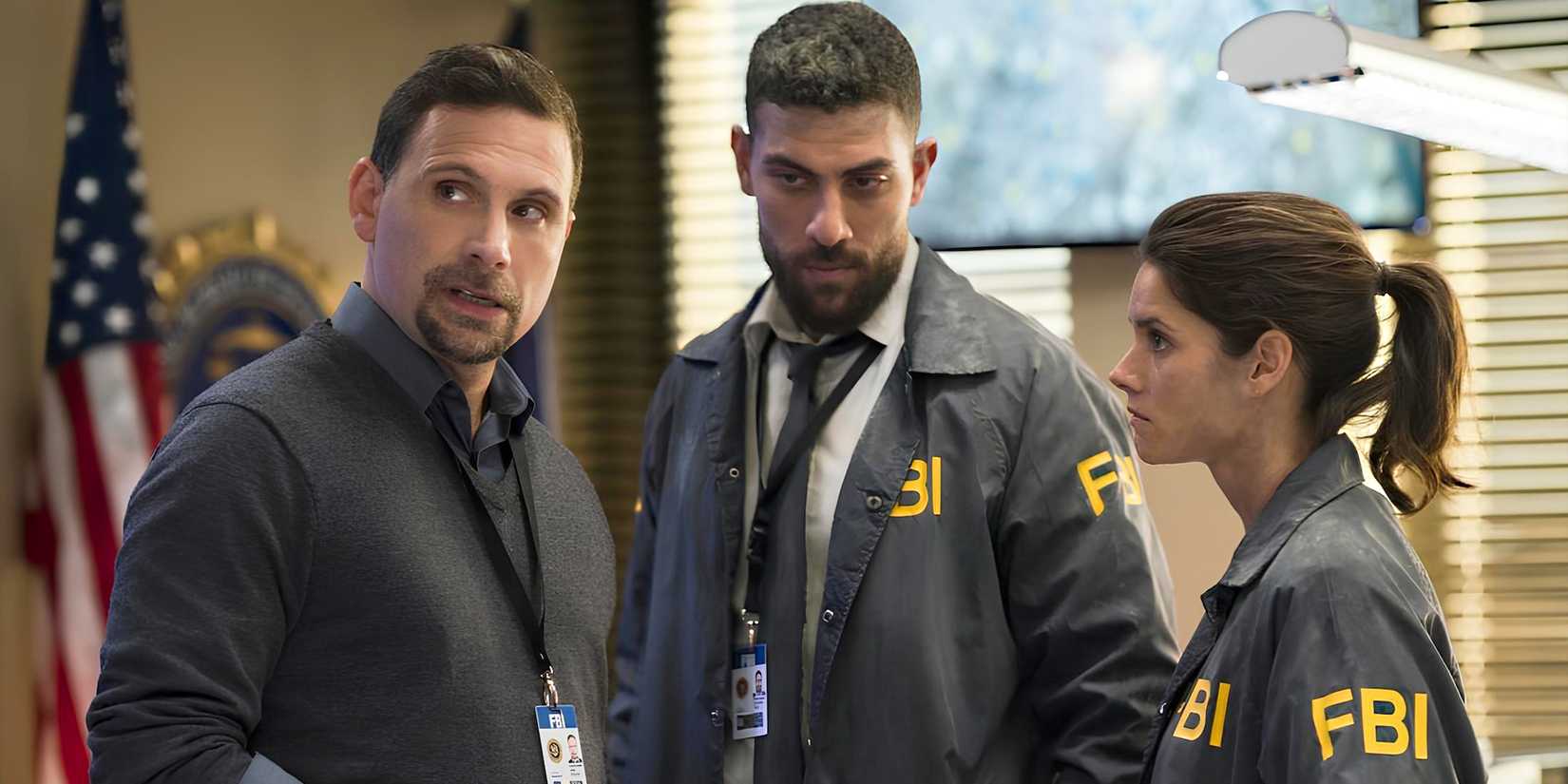
The Calm Before the Chaos
It was supposed to be a triumphant return.
After months off the air, FBI Season 8 kicked off with the kind of pulse-pounding energy that made the franchise a staple of primetime television. Fans had waited patiently through hiatus rumors, speculation about cast changes, and whispers of a “dark new direction.” When the season finally opened, it delivered—but not in the way anyone expected.
Within minutes, the tone shifted from exhilarating to devastating. Special Agent Dani Taylor (Emily Alabi), Scola’s new partner, was gone—her death shocking in its suddenness, but even more unsettling in what it revealed about the show itself.
This wasn’t just another character exit.
It was a statement—a signal that something deeper, more troubling, was unraveling inside FBI’s storytelling DNA.
A Death That Hit Harder Than Expected
Let’s be honest: Dani wasn’t the franchise’s most established agent. Her introduction was brief, her arc promising but short-lived. Yet the reaction to her death was swift and emotional. Viewers didn’t just mourn Dani—they mourned what she represented: the hope that Scola, played with quiet volatility by John Boyd, might finally find balance again after losing so many partners before.
Scola’s journey has always been one of resilience shadowed by isolation. He’s the agent who gives everything but receives little back—caught between his duty to the Bureau and the emotional cost of constantly starting over. Dani brought warmth to that loneliness, a grounding presence that hinted at renewal.
And then, in one episode, she was gone.
Her death wasn’t just tragic—it was symptomatic of a larger problem FBI can’t seem to solve: its inability to give Scola the consistent emotional foundation he deserves. For years, he’s been the franchise’s drifting soldier, forever losing, forever rebuilding. The audience feels that exhaustion because it mirrors our own frustration with the pattern.
A Pattern CBS Can No Longer Ignore
The FBI franchise thrives on rhythm—partnerships, tension, balance. Maggie and OA. Jubal and Isobel. Those duos anchor the emotional equilibrium of the show. But Scola? He’s been denied that stability again and again.
First came Tiffany Wallace (Katherine Renee Kane), whose departure left a gaping void in the series’ dynamic. Since then, the writers have cycled through temporary replacements, each offering glimmers of chemistry before vanishing without closure.
This revolving door has become one of FBI’s quietest but most persistent crises. It doesn’t just affect the character—it affects the structure of the show. Every time Scola gains a new partner, the series has to recalibrate emotionally. Storylines lose continuity. Stakes lose meaning. And by the time viewers begin to invest, the relationship is already over.
Fans aren’t angry because of Dani’s death—they’re angry because it proves nothing has changed.
The Emotional Fallout: What Scola’s Arc Really Means
John Boyd’s portrayal of Scola has evolved from background precision to emotional gravity. In many ways, he has become the heart of FBI’s moral compass—a man torn between duty and vulnerability. But the writing has often left him stranded, forced to absorb loss after loss with minimal emotional resolution.
In Season 8, this tension feels sharper than ever. Losing Dani may be the catalyst that finally breaks Scola—or forces him to confront the Bureau’s toll on his humanity. Will he retreat further into isolation, or will this death push him toward transformation?
The genius of FBI—when it works—is its ability to use crime as a mirror for conscience. Every case tests the agents not only professionally but personally. In Scola’s storyline, the “enemy” isn’t just external. It’s the emotional cost of serving justice in a world where justice rarely feels clean.
Dani’s death amplifies that cost. It’s not about losing a colleague—it’s about losing the fragile hope of connection.
Behind the Curtain: CBS’s Gamble on Shock Value
There’s an unspoken tension between FBI’s creative team and its loyal audience. On one hand, procedural dramas thrive on surprise. On the other, FBI’s strength has always been its emotional continuity—the way each character’s journey weaves into a larger, moral mosaic.
By killing Dani so early, CBS and the writers took a bold swing for intensity. But at what price?
Insiders whisper that the decision came from a mix of scheduling constraints and a desire to “reset the emotional stakes” for Scola. Yet that very reset risks alienating the show’s long-time viewers, who crave evolution, not repetition.
The irony? FBI has mastered high-stakes storytelling—but when it comes to character consistency, it keeps detonating its own foundation.
The Structural Flaw in the FBI Formula
To understand why Dani’s death matters, you have to understand FBI’s architecture. The show is built on duality: every field agent has a counterbalance, every risk a reward. The partnerships aren’t just functional—they’re emotional equations that drive the plot’s rhythm.
Maggie and OA represent the ideal balance: empathy versus instinct, compassion versus aggression. Jubal and Isobel represent duty versus heart.
But Scola? He’s the anomaly—the unanchored agent whose narrative orbit keeps collapsing.
By refusing to give him a lasting counterpart, FBI undermines one of its own most powerful themes: that justice, at its core, is teamwork. Without a stable partner, Scola becomes a metaphor for disconnection—a lone warrior in a system built on unity.
It’s a brilliant tragedy when written intentionally. But when it’s the byproduct of production turnover, it becomes a narrative flaw disguised as character pain.
What Happens Next — And Why It Matters
Season 8 is only just beginning, but its emotional stakes are already higher than ever. The writers now face a critical choice: double down on the chaos, or rebuild the trust between Scola and the audience.
Rumors suggest a new partner is coming—a fresh face with a sharper edge, possibly from within the Bureau’s cyber division. Whoever this agent is, their success won’t depend on screen time—it’ll depend on whether the show can resist its own destructive cycle.
Fans don’t want another body on the team. They want someone who challenges Scola’s walls, complements his intensity, and gives him something worth fighting for, not just against.
Because that’s what FBI, at its best, is about: the humanity buried beneath the badge.

The Deeper Message: When Justice Becomes Personal
What makes FBI endure isn’t just its procedural cases—it’s its portrayal of the people behind them. Every season, we’re reminded that these agents aren’t superheroes. They bleed, they break, and they question the system they’ve sworn to defend.
Scola’s grief is more than a subplot—it’s a reflection of modern law enforcement’s reality: high turnover, emotional burnout, and the quiet loneliness of those who must appear unbreakable.
Through that lens, Dani’s death becomes almost allegorical. She represents the idealism that keeps fading from institutions built on order and sacrifice. Her absence haunts the show because it mirrors something haunting in the real world—the cost of never stopping long enough to heal.
Final Verdict: A Season of Reckoning
If FBI Season 8 continues along this trajectory, it could become one of the most emotionally daring seasons yet—or one of its most divisive.
CBS has always sold FBI as action-driven television, but what’s unfolding now feels closer to a psychological reckoning. The question isn’t just who dies next—it’s who still knows how to live.
Dani Taylor’s death may be just one moment in a long-running franchise, but it’s also a crossroads. For Scola. For the fans. And for a show that must now decide whether to chase ratings or rediscover its soul.
Because when justice becomes personal, every choice has a body count.